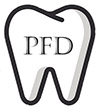
Dentures are replacements for teeth that have been lost. Depending on the amount of tooth loss, dentures may be partial or complete. Partial dentures are teeth attached to a gum-colored base made of acrylic. A partial fills in the space left by missing teeth to prevent remaining teeth from shifting. Complete dentures are made when all teeth need to be taken out and are made in advance before teeth have been removed and are fitted frequently up to 6 months when the gums become stable.
How Dentures are Made
The development of dentures is a process that takes place over several appointments. This may be done by a dentist or a specialist called a prosthodontist who specializes in tooth replacement and restoration. After determining which type of dentures are appropriate, the next steps are:
- Making jaw impressions and measuring the space between the jaws to see how they relate
- Creating wax forms, plastic patterns or models in the position and shape of the dentures
- Assessing the fit, shape and color before making a final cast
- Casting the final denture and making necessary adjustments
Adjusting to Dentures
New dentures may feel strange at first. It is not unusual for them to seem loose until the tongue and the cheeks get used to holding them in place. There may also be gum irritation and increased saliva flow, which will lessen as the mouth adjusts. When eating with new dentures, it is best to cut food into small pieces and to chew slowly. Hot foods, shells, bones and other hard foods should eaten with caution. Gum and sticky foods should be avoided and toothpicks should never be used. Saying certain words may also prove difficult with new dentures. This issue improves with practice.
Wearing Dentures
The patient will be instructed on how long to wear dentures each day and may be asked to wear them around the clock for the first week. While this may be uncomfortable, it is the best way to determine if adjustments need to be made. Once the dentures are fitted properly, they may be removed at night before bed.
Denture Care
Much like natural teeth, dentures require daily care.
- Removal and rinsing after meals
- Brushing daily
- Soaking overnight
In addition, the mouth should be cleaned after denture removal and before putting them back in. This maintains oral health and will keep dentures fitting well.
Dentures are an excellent solution for missing teeth, and most dental insurance policies will cover some or all of the cost.
